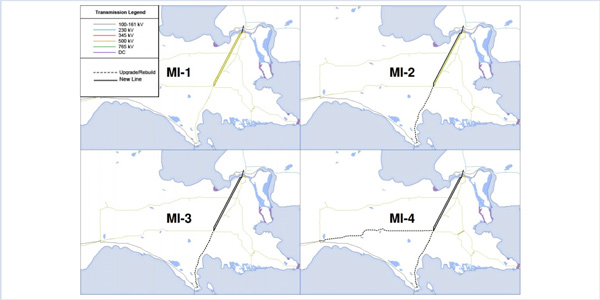By Amanda Durish Cook
MISO has concluded there’s little economic benefit to new transmission connecting Michigan’s Upper Peninsula to Ontario.
Reporting on the results of a study requested by the state, MISO officials told a Nov. 1 Economic Planning Users Group call that none of several potential new lines through the twin Sault Ste. Marie cities on the U.S.-Canada border produces benefits commensurate with their costs over a 20-year span.
“Due to the relatively low transfer capability and relatively high construction cost, none of those transmission ideas provided enough benefit to cover its cost,” said MISO Manager of Economic Studies Zheng Zhou.
Currently there’s no transmission connection between Ontario and the UP, although the Lower Peninsula has connections to the province’s hydropower system. Michigan Gov. Rick Snyder requested the study last August in search of solutions to alleviate persistently high power costs in the UP. (See Michigan Asks MISO to Study Tx Links to Ontario.)
MISO worked on the study with Ontario’s Independent Electricity System Operator (IESO), which found it could reliably transfer a maximum of 125 MW to the peninsula. Beyond that amount, “significant reliability upgrades would be needed on both systems to increase that transfer capability,” Zhou said.
Economic Studies Senior Engineer Tim Kopp said MISO studied 16 potential new lines, including 161-kV, 230-kV, 345-kV and DC options. It also found that the benefits of a new 400-MW combined cycle plant in Kalkaska County or a 100-MW plant at the nearby Pine River substation would not outweigh their costs either.
MISO did identify benefits over 20 years if a sub-345-kV transmission line allowed 400-MW transfers, but the scenarios showed the local 115-kV system couldn’t reliably support that amount in its current state and would need expensive upgrades.
Final public results of the study will be posted in mid-December, Zhou said.
Customized Energy Solutions’ Ginger Hodge asked if study results would be included in this year’s MISO Transmission Expansion Plan. Zhou said the study was considered ad hoc and not an MTEP study.
Zhou agreed to a request by Michigan Public Service Commission staffer Bonnie Janssen to present the study’s findings at the MISO Board of Directors’ December meeting.
MISO’s study results arrived a week after the PSC approved Upper Michigan Energy Resources Corp.’s $277 million plan to build two reciprocating internal combustion engine stations in the UP in spring (U-18224). Chairman Sally Talberg said the plants will result in a “more reliable and affordable” electric supply for UP customers, including the Tilden Mining operation. Tilden will cover 50% of the capital costs of the plants along with fixed operations and maintenance expenses.
The plants will replace the costly system support resource agreement that keeps the Presque Isle Power Plant running. In October, FERC ruled that ratepayers were overcharged by nearly $23 million for continued Presque Isle operations. (See $23 Million Owed to Ratepayers in Presque Isle SSR Case.)





